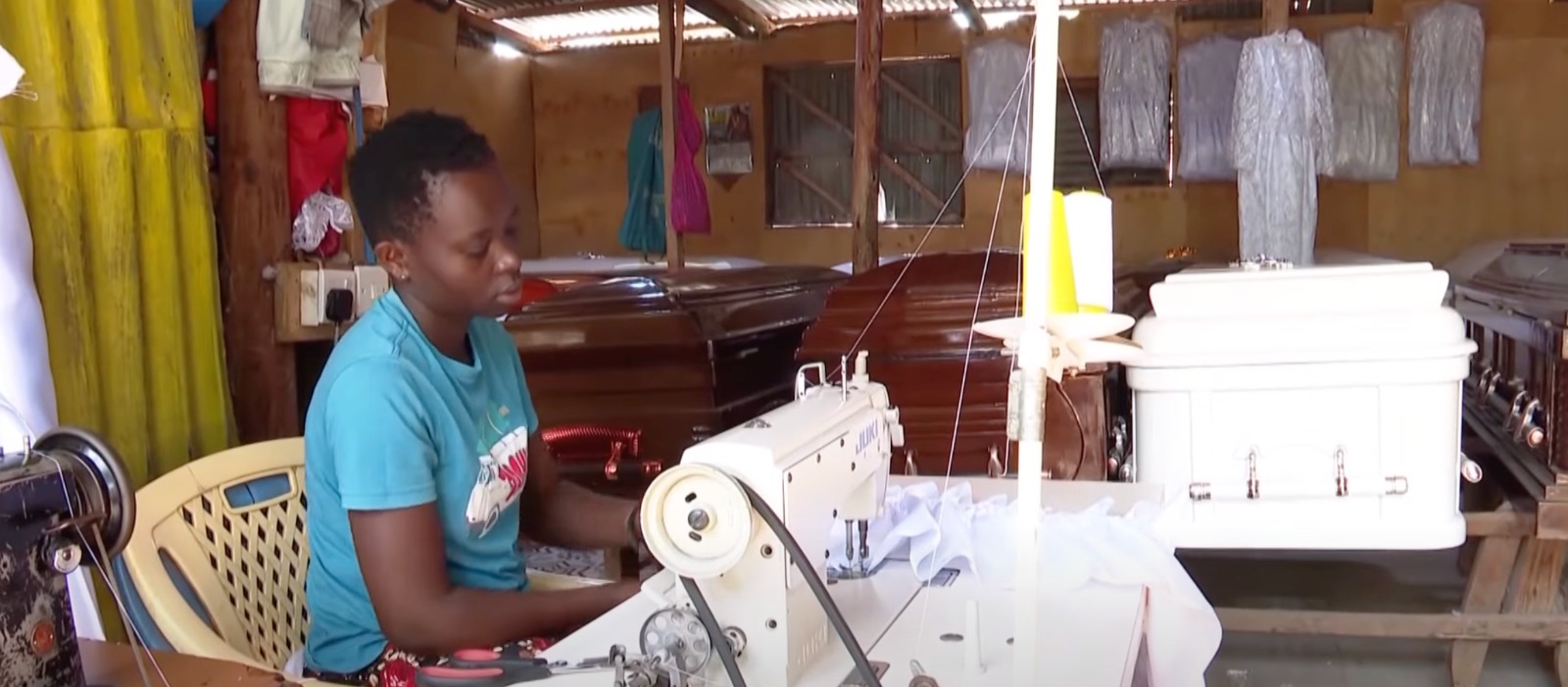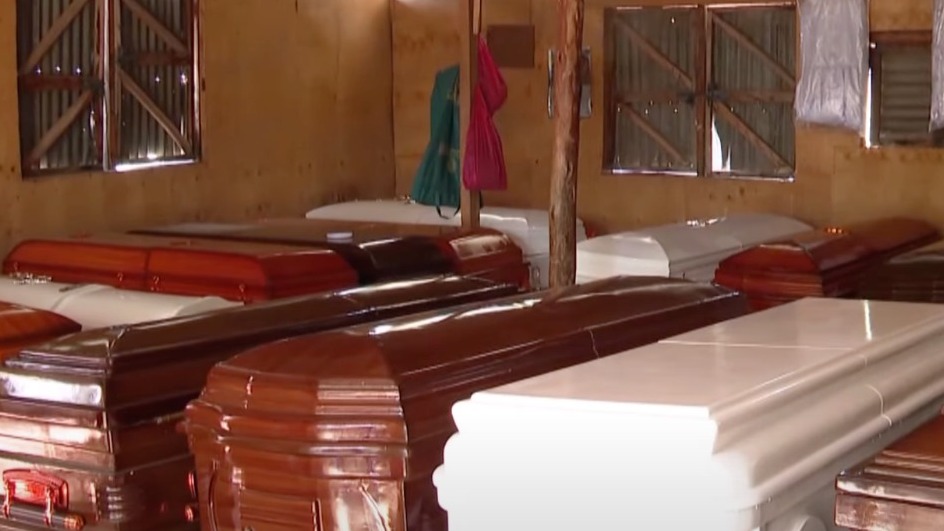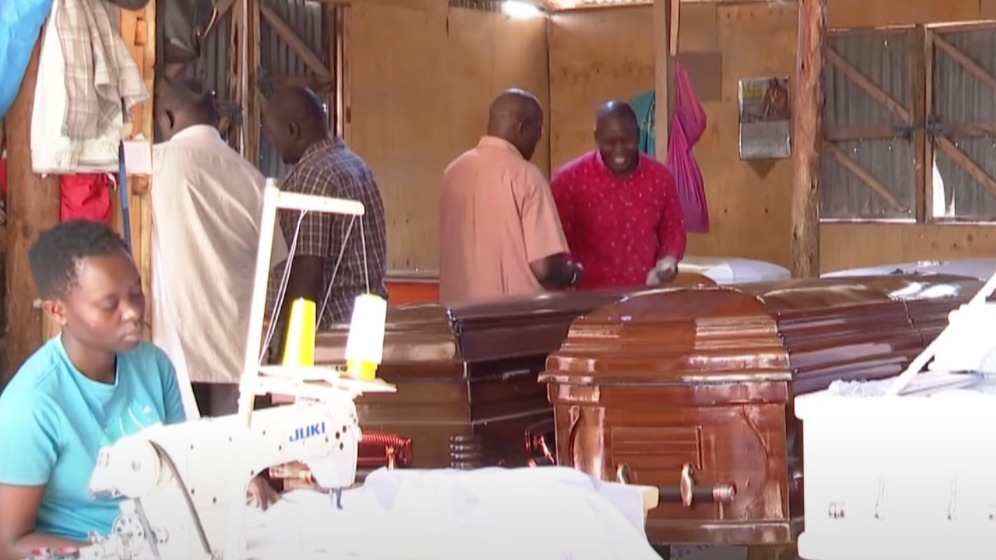
Breaking Barriers: Women enter coffin trade in Western Kenya
Story By
Regina Mulea
CGTN Africa
In Kisumu, a bustling city on the shores of Lake Victoria in western Kenya, the sounds of hammers and saws fill the air. But inside the Ofunyu Jerusalem workshop, something more profound than carpentry is taking place.
Here, among planks of wood, clouds of sawdust, and the scent of varnish, women are doing a job few expected: making coffins. They’re breaking gender barriers and reshaping perceptions of what women can do.
This workshop isn’t just about building coffins. It’s about giving women opportunity, challenging long-held beliefs, and restoring dignity one coffin at a time.

From Cleaner to Carpenter
Silvia Omondi’s journey into this male-dominated trade was driven not by ambition, but by necessity. A single mother of one, Silvia once worked as a cleaner, earning just 100 Kenyan shillings a day, less than two U.S. dollars, barely enough for a single meal.
“I had no choice,” she says, her voice calm but resolute. “I had to feed my child.”
When a friend offered to teach her how to make coffins, she hesitated. But desperation and courage pushed her forward.
“He told me, ‘This is men’s work. Can you handle it?’ she recalls. “And I told him, ‘This job may be surrounded by fear and superstition, but with the hardship we face in this country, there are no jobs strictly for men or women. If you’re determined, you’ll make it.’
Today, Silvia confidently sands wood, measures frames, applies varnish, and helps craft coffins that are both functional and respectful. Her hands, once used to wash clothes and scrub floors, now build final resting places and a stable life for her child.
Silvia also sews, combining carpentry with tailoring, a practical choice.
“Right now, my high school certificate is being held by the school,” she explains. “I’m doing this work so I can pay off my fee arrears and get it back.”
Her story reflects that of many young Kenyans facing limited options. In a country where youth unemployment stands at over 67 percent, unconventional jobs are not just lifelines — they’re powerful acts of resilience against a system that often leaves the youth behind.

Where Craft Meets Calling
The Ofunyu Jerusalem Workshop is the vision of Reuben Onyango, a carpenter with a mission not just to build coffins, but to build lives.
He started the workshop to train young people who might otherwise be jobless, idle, or vulnerable to the unrest that frequently erupts on Kenyan streets.
“You don’t have to work in an office to live a dignified life,” Reuben says. “What matters is doing honest work, the kind that feeds your family and brings you peace.”
The workshop runs on discipline. The team often works over 12 hours a day, six days a week. It’s dusty, physically demanding, and emotionally heavy, but deeply noble.
After all, death is universal. And the service they provide, creating dignified send-offs, touches every family, eventually.
Turning Taboos Into Tools of Empowerment
Despite their commitment, the women of Ofunyu still face stigma. Some whisper that coffin makers “wish for death” to earn a living. Others suggest they find “cleaner” work, perhaps selling vegetables or working in shops. But Silvia has learned to brush off the judgment.
“Some say this work is cursed. That I should quit. But even when I go home to sleep, I just think about going back to work,” she says with a smile. “Because I love my job.”
Her income now far exceeds what she earned as a cleaner. More importantly, it provides her with independence, pride, and the ability to care for her child with dignity.
Changing the Narrative for Women
The rise of women in coffin-making is about more than employment; it signals a cultural shift.
In many African societies, death is sacred and feared. Coffin-making, by extension, is often considered taboo, especially for women. But these women are rewriting that narrative.
They are proving that no job is beneath a woman and that all honest work deserves respect, not shame.
Their message is simple but powerful: Work is work. Honest hands know no gender.
Silvia is more than a carpenter and tailor. She is a mother, a sister, a daughter, and a quiet trailblazer. In her resilient way, she is challenging norms, dismantling stereotypes, and inspiring a new generation of women to claim space in places they were once told they didn’t belong.
She’s not just crafting coffins, she’s shaping futures, restoring dignity, and proving that even in a job built around death, there is space for pride, purpose, and hope.
And that, perhaps, is the most life-affirming thing of all.






